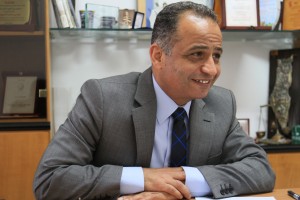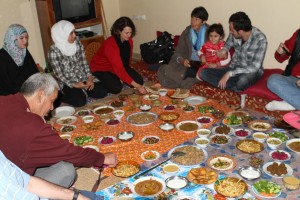Gaza: Little time and so much to do, by Gerri Haynes
(Gerri Haynes, a former president of Washington Physicians for Social Responsibility, is once again sending back reports from inside blockaded Gaza. As she did four times before, Gerri has organized a team of doctors and other health care providers to work in hospitals and clinics in Gaza in an effort to directly help the people there and to bring attention to the ongoing humanitarian crisis that the Israeli blockade has created. Sixth in the series.)
Because our schedule has been compressed, we are trying to fit service and meetings into a brief period of time. We are dispersed, learning and working. Rich and Ismael, pediatric urologists are spending their days and long evenings operating on children at two of Gaza’s hospitals. Ahmed Abeid, anesthesiologist is working in operating rooms with Rich and Ismael and teaching in the medical school.
This morning, some members of our group heard from a deputy of the Palestine Center for Human Rights – an organization critical to the mental health of the people of Gaza. Without regard for political affiliation, PCHR serves the rule of law – assisting people in Gaza and the West Bank. Their work focuses not only on Israeli abuses, but on Palestinian Authority and Hamas abuses of the human rights of Palestinian people. They work with many other NGOs including GISHA and Physicians for Human Rights Israel. Following Cast Lead when 1400 people were killed (many of them women and children) and more than 5000 homes were destroyed, PCHR filed 495 civilian cases against Israel. Of all of the well-documented human rights abuses by Israel, only one soldier was held accountable for his actions. He was sentenced to seven months in jail for credit card theft.
Later in the morning, I spoke with the Director of the Women Affairs Center and her assistant about the grief experienced by mothers in Gaza. I heard again that all people of Gaza have been affected by the siege and the violent attacks on the civilians of Gaza. Their grief is complicated by the constant threat of further attacks. I asked them what they would like the people of the United States to know. This is what they replied: “What happens to us is different from anyplace else in the world (they live in a prison with limited access to essential materials of living): How can you imagine in the US or Europe the situation here…we have lack of fuel, it is dark for more than half the day because of the electrical cuts, we cannot do our washing to clean our clothes, we cannot use the computer, we cannot drive our cars or cook our food because of the fuel shortage. All the time, we live in danger. At one time, I cooked by making fire from my children’s books. Cleaning my children’s clothes, my fingers bleed. Most men are without work – there are no opportunities for work. Many young men and women who are promised in marriage do not marry because there is no economy – no place to live together. Palestinian women need peace. We are frustrated – there seems to be no future for us or for our children. No one can live like this.”They spoke of a mother whose son works in the tunnels. (The tunnels connect Egypt and Gaza and more than 200 people have died in the tunnels.) She waits for him every day to come home – always worried because the work is so dangerous, always fearing that someone will knock on her door to tell her that her son has been killed. Her husband has no work and there seems to be no alternative to this tunnel work – no other way to earn money for food.
These women reported that a recent study described that 88.4% of the women in Gaza face economic violence – no money for food, clothing, fuel and no control over the finances of their homes. Culturally, husbands control all finances even when the woman works outside the home. When the husband is unable to find work, the situation is even more complex and violence in the home is a threat.
This afternoon, I worked with mental health professionals from the Gaza Community Mental Health Programme as they evaluated a family whose son was recently killed and whose mother is critically ill. The GCMHP sends teams into homes to complete comprehensive evaluations and then serves individuals and families throughout Gaza. In the current situation, with the constant threat of external and internal trauma, this program is desperately needed. Funding is always needed and international donors are critical to the continuation of their work.
Tonight, we were treated to a spectacular vegetarian dinner in the Al Basheer home – family of Abed, who attends Washington State University, and his wife, Kara. Abed’s father will be coming soon to the United States for help with his vision – we look forward to seeing him again!
RSS feed for comments on this post. TrackBack URI

